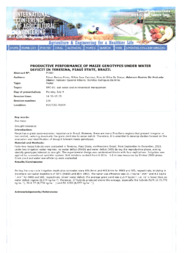Productive performance of maize genotypes under water deficit in Teresina, Piauí State, Brazil.
Productive performance of maize genotypes under water deficit in Teresina, Piauí State, Brazil.
Author(s): BASTOS, E. A.; CARDOSO, M. J.; SOUSA, R. S. de; ANDRADE JUNIOR, A. S. de; RIBEIRO, V. Q.; BRITO, R. R. de
Summary: Maize has a great socio-economic importance in Brazil. However, there are many Brazilians regions that present irregular or low rainfall, reducing drastically the grain yield due to water deficit. Therefore, it is essential to develop studies focused on the evaluation and identification of drought tolerant maize genotypes. Forty-two maize hybrids were evaluated in Teresina, Piauí State, northeastern Brazil, from September to December, 2010, under two irrigation water regimes: no water deficit (NWD) and water deficit (WD) during the reproductive phase, aiming identify genotypes tolerant to drought. The experimental design was randomized blocks with four replications. Irrigation was applied by conventional sprinkler system. Soil moisture content from 0.10 to 1.0 m was measured by Diviner 2000 probe. Grain yield and water use efficiency were evaluated. During the crop cycle irrigation depth plus rainwater were 692 mm and 491 mm for NWD and WD, respectively, implying in maximum soil water depletions of 26% (NWD) and 75% (WD). The water use efficiency was 11.7 kg.ha-1.mm-1 and 4.6 kg.ha-1.mm-1 for NWD and WD, respectively. Under water deficit, the average grain yield was 2,270 kg.ha-¹, i.e. 72 % lower than no water deficit regime (8,058 kg.ha-¹). Moreover, 18 hybrids produced above the average, especially the hybrids ALFA 10 (4,770 kg.ha-¹), 30 A 37 (4,724 kg.ha-¹ ) and BX 1200 (4,562 kg.ha-¹ ).
Publication year: 2012
Types of publication: Paper in annals and proceedings
Unit: Embrapa Mid-North
Keywords: Déficit de água, Eficiência do uso da água, Zea Mays
Observation
Some of Embrapa's publications are published as ePub files. To read them, use or download one of the following free software options to your computer or mobile device. Android: Google Play Books; IOS: iBooks; Windows and Linux: Calibre.
Access other publications
Access the Agricultural Research Database (BDPA) to consult Embrapa's full library collection and records.
Visit Embrapa Bookstore to purchase books and other publications sold by Embrapa.

